The Inchon Dwyer Group went live today with the All Marine Radio component of the All Warrior Radio Network up and running at allmarineradio.com. Back in 2010 I had a chance to visit the 1st Marines (call sign Inchon) at Camp Dwyer and wrote about my good friend Mike ‘Mac” McNamara and the 1st Marines CO, Col (now BGen) Dave Furness. Mac is the founder, CEO and driving force behind the Inchon Dwyer Group which has big plans to mobilize the veteran community to effectivly address mental health issues. At 1100 EDT today (1 June 2016) All Marine Radio will be broadcasting their first interview featuring the Commandant of the Marine Corps General Robert B Neller, USMC. Hit the link above and give it a listen and also take the time to watch Mac’s YouTube video explaining the mission of The Inchon Dwyer Group…you’ll be hearing a lot about them in the future.
Inchon is the call sign for the 1st Marine Regiment – currently deployed in southern region of the Helmand Province as Regimental Combat Team 1 (RCT 1). They are operating out of a large FOB in the middle of the Dasht-e Margo (Deseret of Death) about 50 kilometers from the Provincial capitol of Lashkar Gah, named Camp Dwyer. Unlike other FOB’s I’ve visited this massive base has lots of room but very few people. The Marines don’t like FOB’s much and having (by design) a lean tooth to tail ratio (trigger pullers to support personnel) this is what one would expect to see.
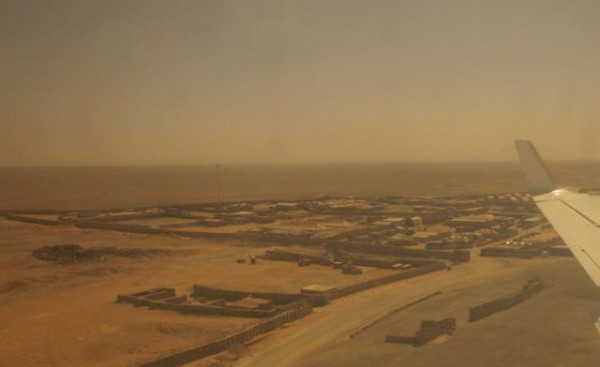
RCT 1 is commanded by another close friend of mine Colonel Dave Furness, USMC, of Columbus, Ohio. Like my friends featured in previous posts, Colonel Paul Kennedy USMC and Lieutenant Colonel Jeff Kenny USMC, Dave was on the staff of the Marine Corps Infantry Officer course with me back in the early 90’s. The four of us also commanded recruiting stations in the late 90’s (the Marines take recruiting seriously) and as is often the case in the Corps we would bump into each other in places like Okinawa, Korea or Thailand when assigned to Fleet Marine Force infantry units.
When I arrived at the RCT 1 headquarters building I was shown into a large office where Dave was waiting with a warm smile, big bear hug and man was he a sight for sore eyes. We sat down and Dave started reading me in on his view of the operational situation he’s dealing with in the Southern Helmand. I started taking notes:
“Timmy planting guys in the ground is easy, I don’t even worry about that, leaving it to the Battalion Commanders. You know what I worry about? The time horizon. That’s my problem because it impacts my grunts and I’m the only guy in this lash-up who can effect it. The main problem we face here is that the poppy has a value added chain. A farmer is given the seed, he is given the fertilizer – poppy doesn’t take much water or care while growing – and at harvest time he is given guys who score the flowers and collect the dope. At the end of the season he is given a portion of the harvest to sell or barter. The dope is then moved, processed and smuggled out of the country. Poppy has a well established added value chain which provides employment for lots of people while making life easy for the farmer. It costs him little to grow and doesn’t take much work. We want to sell him seed and fertilizer for a crop which is difficult to grow and much more susceptible to failure due to bad weather, floods and insects. We want him to harvest it and want him to take it to market and sell it. There are no value added processes to employ other people. There is no cold storage, no food processing plants, no grain elevators, no good roads, and no teamsters to truck produce using economies of scale. What would you do if you were a farmer in southern Helmand?”
Readers who have been following the Afghan campaign over the years must be depressed at hearing this. What Dave identified as the problem is exactly what military and development experts identified as the problem nine years ago.
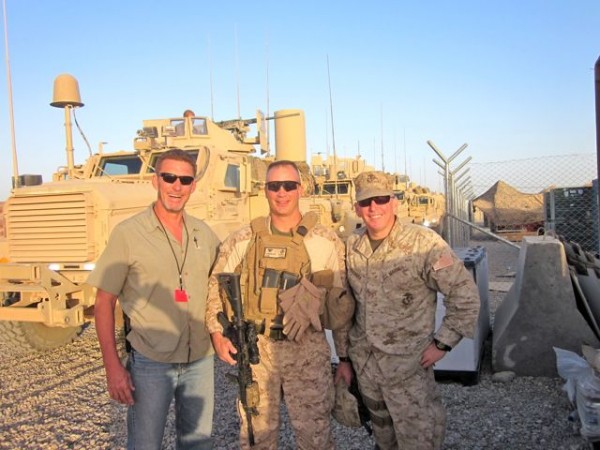
We talked about why, after so long, we’re still talking about the problem instead of fixing it but I don’t want to get my buddies in hot water for bitching about how difficult it is to do what should be easy so I’ll move on to something I also found interesting – the time horizon. Like every other commander in theater Dave is frustrated to the point of insubordination with how slow we are at funding and executing projects. More from Colonel Furness:
“I’m not doing much clearing; the 7th Marines (who rotated home a few weeks ago) did all the clearing. Paul (who commands RCT 2 in Delaram) is fighting like a lion up north right now but we’re pretty much policing up small cells of die-hards which isn’t that hard. Marjah is still active but as we expand out of the district center we’re getting that under control. I’m still losing guys, I still take KIA’s and I have had several Marines lose limbs. I hate that, hate seeing my guys get hit but we’re dishing out more than the bad guys can take so the kinetics will die down. What I want for my Marines is a reasonable time horizon for reconstruction projects so they can see the fruits of their sacrifice. I can do the paperwork for 40 or 50 projects which I know will create the value chain needed to beat the poppy and there is no chance that me or my Marines will see any of it done, or even started, even if they get approved and “fast tracked.” My guys are patrolling three times a day, eating Mr. E’s or local chow, they sleep on the deck in the dirt and I want them to see why they are doing this. We like the Afghans; every one of them we talk to asks for two things: all weather roads and schools for their kids. They know they are doomed to a lifetime of hard labor with no chance at upward mobility because they are illiterate, so they want a better life for their children. My Marines who are out there living in the dirt and heat and filth with them want the same thing. But I can’t build schools with my CERP funds, nor can I hire teachers with my CERP funds and working through the regional contracting command to program money for those things is like pulling a diamond out of a goat’s ass. It is just doesn’t happen.”
I wanted to talk war but the warrior wanted to talk value added chains and time horizons. “We’ll talk about that later in detail with the staff, I have a treat for you, lets go see Mac.” I had not seen Mac since 1994 and had no idea he was deployed here with Dave.

Major Mike McNamara USMCR, left active duty in the late 90’s, moving his family to North Dakota where he has a regular job, coaches the high school baseball team (his Dad managed the Boston Red Socks) serves on the city council and has his own radio show. Mactalk has got to be among the most entertaining radio shows in the nation. Mac is one of the smartest, funniest people I have ever met. That’s saying something too – Jeff Kenny is so funny that The Bot couldn’t eat chow around him. Jeff would come up with totally bizarre observations that were so funny Shem would have soda coming out of his nose or start choking on his food he was laughing so hard. Mike doesn’t drill with the reserves and only puts on the uniform when his friends ask him to come run their Combat Operations Center (COC) when they go to war. This is the third time he has been called and it is also the third time a general officer has had to tell the manpower weenies at HQMC to shut up, activate McNamara and send him overseas without delay. Mike will never be promoted past the rank of Major and couldn’t care less – when his buddies call he drops what he’s doing and comes overseas for a year at a time. Every time.
Mike was set up in the COC like a grand pasha with several computer screens and a few log books arrayed in a semi circle in front of him. He was in the process of planting some guys into the ground who had been foolish enough to start sniping at a Marine patrol. We watched the feed from a Reaper who was loitering about 2o,ooo feet above the doomed Taliban – it was invisible, inaudible, and alert. The Reaper was hanging Hellfires on its weapon pylons and as we watched it sent one screaming towards four villains when they huddled together next to a wall out of sight of the Marines they had just attacked.
The Hellfire is a supersonic missile but when it makes its final course correction just prior to hitting target it slows to subsonic speed. The sonic boom gets ahead of it so that the targets hear it about 1.5 seconds before it strikes. Sure enough three of the four look straight up at the sound while the fourth immediately started running like an Olympic sprinter. A bright flash and the three Lookie Lous’ disappear – the sprinter starts to stagger clearly wounded. Within the hour he would be joining us at Camp Dwyer where he received state of the art medical care and will be kept in the base hospital until well enough to be turned over to the Afghan Army.
The Hellfire is pinpoint accurate with a limited ECR (effective casualty radius). Designed to kill enemy armor the military has discovered it is the perfect weapon to shoot at human targets because they can take out guys leaning against a wall without any damage to the wall or people standing just a few feet away.
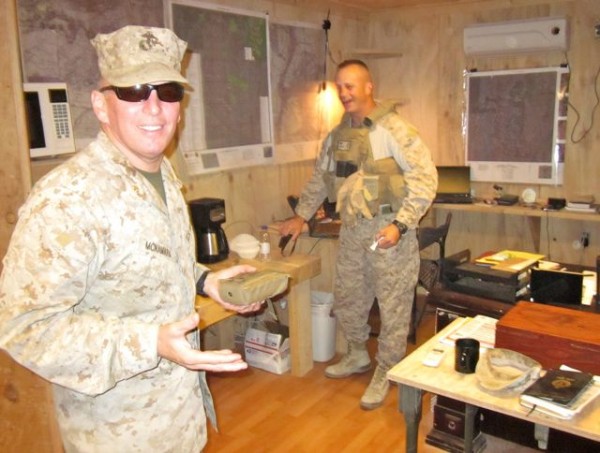
The morning news feed contained this story: yet another front line dispatch about restrictive rules of engagement. Which was most timely because I asked Mac about that yesterday and I give him the last word.
“This is “smart guy” war dummies get people killed here just like they did in al Anbar Province (Iraq). The current ROE emphasizes the preservation of civilian life except in extreme cases which is fundamental to winning the civilian population and also fundamental to “winning the peace.” Anybody who doesn’t understand this is either stupid or inexperienced in this business. When our Marines are in contact near structures or civilians and ask us for supporting fires we ask “are you unable to maneuver?” Answer: “…wait one… then you get “…we’re good, we can still maneuver…”
Even though it’s harder you restrain your firepower allowing the ground force to work the problem while we get attack helicopters, or jets or drones into a position to use precision weapons is how you keep the pressure on miscreants until you can whack them. This is smart guy war from squad to RCT (Regimental Combat Team) level.
We also use our air assets to do “show of force” runs in order to suppress accurate small arms fire and that works too. There are creative non-kinetic things you can do before you have to drop the hammer. Our Marines are great at exercising restraint; it’s amazing to me to see them work each day.
My take on those who bitch is that they haven’t studied the ROE close enough to learn the “in’s and out’s”. We run rotatory and fixed wing CAS (close air support) multiple times every day. We understand killing civilians sets the effort back in a huge way… especially when we are beginning to see so many positive signs in the AO. BUT, we know we can protect our Marines and we do. Smart guy war is harder, it demands more from both the Marines in contact and my guys who are just itching to unload ordnance on the bad guys.
I’ll tell you what’s tough and that’s the days after we have had our own killed or badly wounded. Those days are the most challenging in terms of restraint. When we’re evaluating targets on those days you can feel the vibe in the room is different. That’s when the adults have to show up and keep things solid. It’s not easy and it’s not fun but that’s what we’re paid to do; be the adults.”
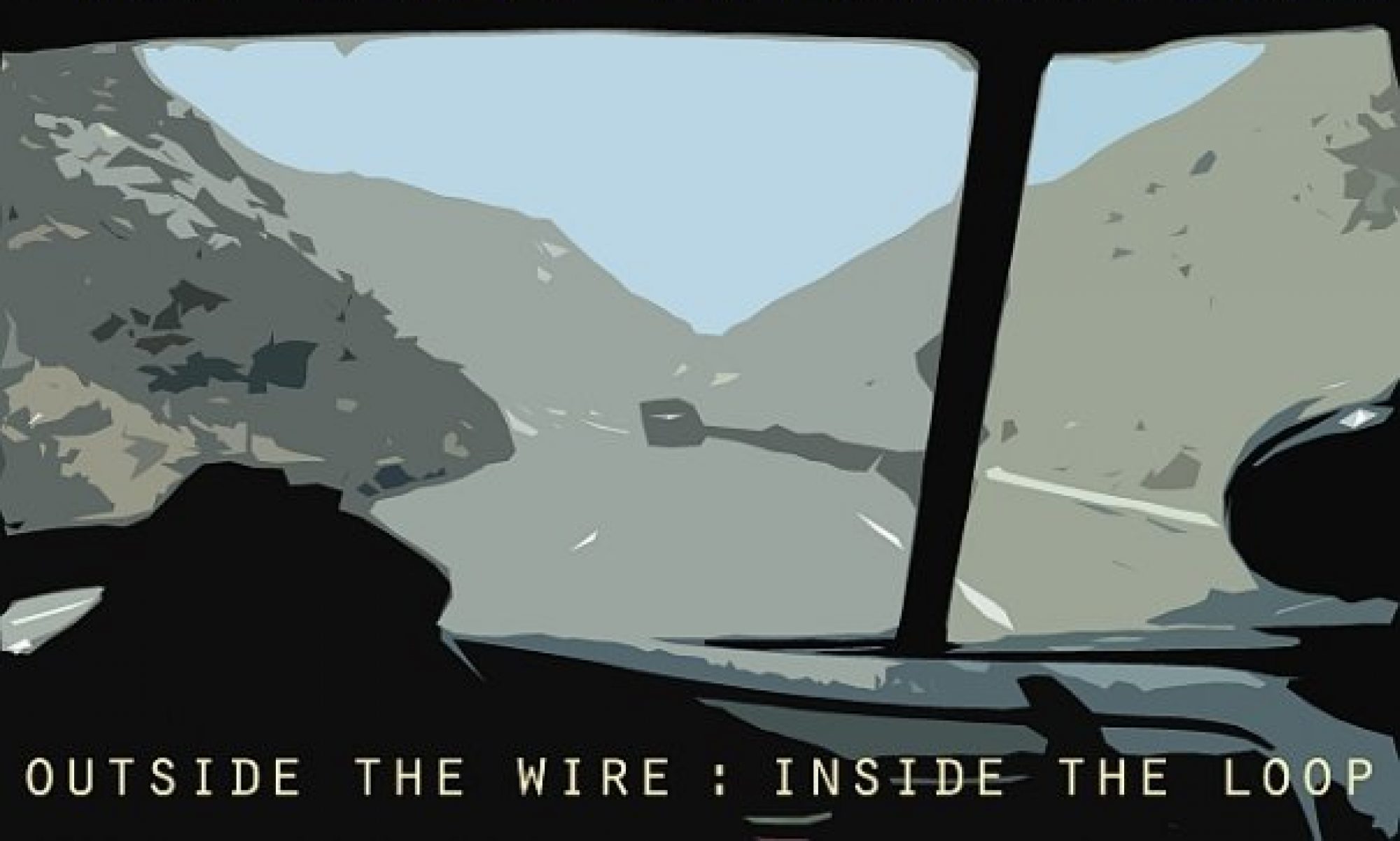
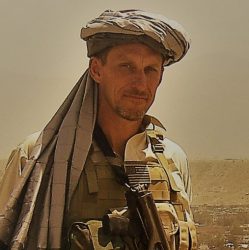

What struck me most about working with the military, and USMC, especially is how a bunch of hard working, bright, highly qualified, gung-ho guys can be so clueless. Clueless in the sense of having no empathy for the Afghans.
Robert McNamara said, well after Vietnam, that the main US problem was lack of empathy for the Vietnamese. The US was incapable of seeing things from the enemies perspective. I watched Restrepo recently and was struck by the same thing. Intelligent, hard charging army officers who thought road building jobs would balance out civilian deaths, injury and property damage. Yet every single military member I’ve questioned thought the idea that if the US was occupied would they help the occupiers in return for material gain to be an offensive suggestion.
This is why the adventures in the Greater Middle East have failed. Not because we lack enough anthropologists or CERP money. Not because we don’t bomb enough or build enough schools. It’s because people don’t like having armed foreigners tell them what to do. If you want to improve the economic lives of the Afghans get the military out of the development business. It’ll be cheaper and cost less blood on both sides.